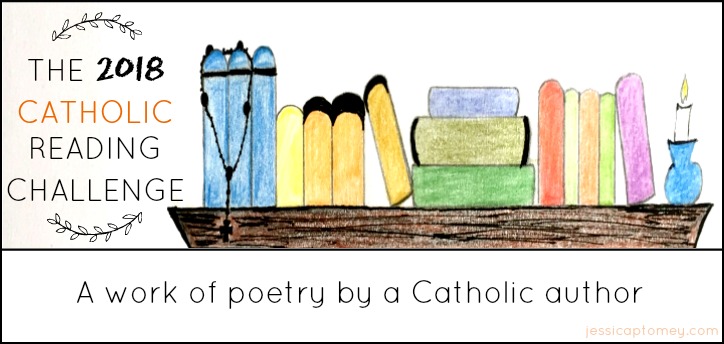Are you participating in the 2018 Catholic Reading Challenge? If not, it’s never too late to start — join us! I share my picks for each category about once a month. So far, the categories have been diversifying my reading life, particularly this next pick…

Category: “A work of poetry by a Catholic author”
My Pick: The Poems of Gerard Manley Hopkins
I stumbled across a very helpful post at The Catholic Gentleman while determining what poet I should read for this category. It was a hard choice, but I ended up going with Gerard Manley Hopkins. No regrets here. (And now I have a solid list of remaining poets to work my way through next. First runner-up: Edith Sitwell.) Disclaimer: I’m not sure if the edition I linked to on Amazon is the exact one that I read, since my copy was a wonderful old and falling apart hardback from the library. However, I’m sure that most collections would have all of the same poems.
What I loved…
Hopkins’ faith and Catholic identity come through strongly in his poetry. There is a good bit that is symbolic, and then there are a good many poems that are commemorative. (Admittedly, I lacked the context for fully understanding some of them.) For example, he wrote a beautiful poem in commemoration of a group of nuns who drowned in a shipwreck. When reading selections such as these, I thought of him as a eulogist. There was also some moving symbolism used with the Blessed Mother, a fairly common subject in his poetry as well.
A serendipitous occurrence…
Fascinating fact: Hopkins was also a translator of hymns for the Catholic Church, specifically for the Liturgy of the Hours. Amazingly, while in the middle of his collection of poems, I happened to be praying Morning Prayer, and the hymn selection for that day was a hymn originally written by St. Thomas Aquinas, translated several times over the years; the last translator? Hopkins! What are the odds that I happened upon that hymn while in the midst of his poetry?! Very cool. And what’s interesting is that Aquinas’ hymn verse was quite similar to Hopkins’ own style of verse and rhyme pattern. (Perhaps that’s due to him being the translator.)
A seasonal selection…
The poem that really resonated with me the most was “Easter,” and that’s probably because I was reading this during the Easter season. I was so grateful to have such beautiful words to meditate on during that resurrection season. But since May is Mary’s month, I will share a few stanzas of “The May Magnificat” with you:
May is Mary’s month, and I
Muse at that and wonder why:
Her feasts follow reason,
Dated due to season–
Candlemas, Lady Day;
But the Lady Month, May,
Why fasten that upon her,
With a feasting in her honour?
Is it only its being brighter
Than the most are must delight her?
Is it opportunest
And flowers finds soonest?
Ask of her, the mighty mother:
Her reply puts this other
Question: What is Spring?–
Growth in everything–
Skipping ahead a couple of stanzas:
All things rising, all things sizing
Mary sees, sympathising
With that world of good,
Nature’s motherhood.
Read the whole thing. It would be a beautiful thing to share in your domestic church during Mary’s month.
Take away…
Poetry expresses ideas and emotions in a language all its own. Thus, Catholic poets whose faith ignites the imagination of their verse offer us treasures not to be neglected. I firmly believe we should always have a book of poetry in our current reading stacks. This gem is the one in my stack at present. The reading of poetry today is far too uncommon, and recitation of poetry more rare yet. Let’s all commit to finding ways to reinstate and revitalize the reading and recitation of poetry in our individual homes and communities!
What did you read for “a work of poetry by a Catholic author”?

Copyright 2018 Jessica Ptomey

I read A Spiritual Canticle of the Soul by St John of the Cross.
I found the canticle lovely, a New Testament Song of Solomon; I found his explanation of his canticle a bit repetitive but overall really interesting.